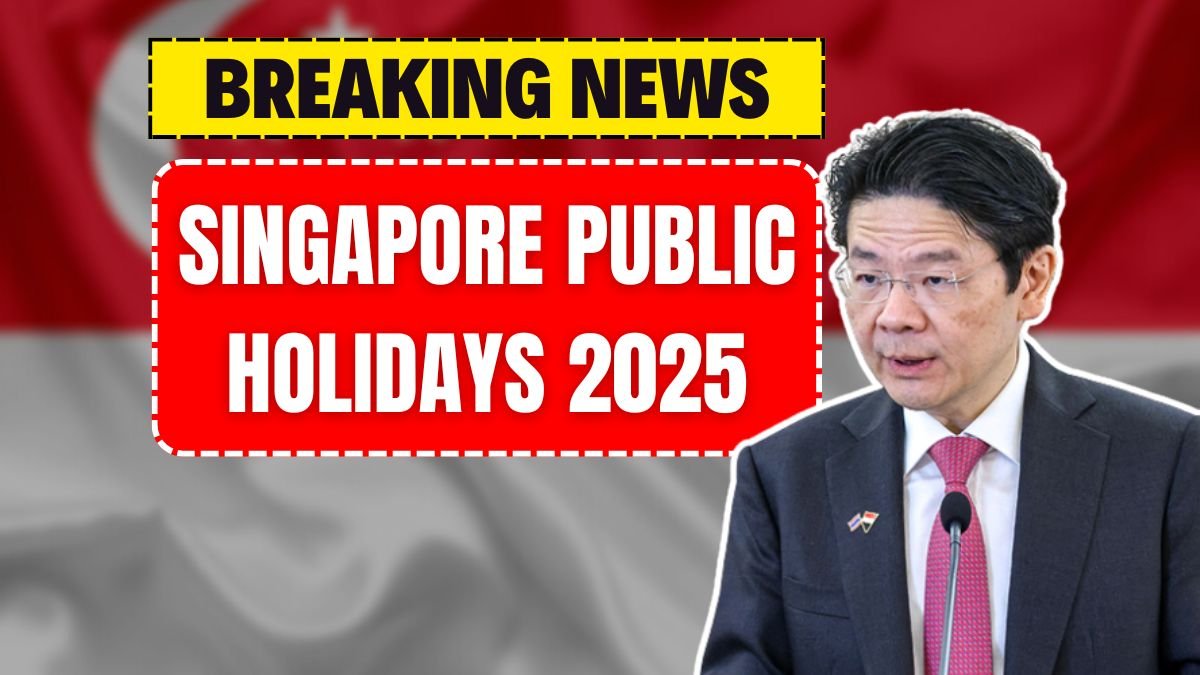When we talk about a developed, busy and culturally diverse nation like Singapore, public holidays are not just a day off, but they are mirrors that reflect the soul of the society. The year 2025 will be special for the citizens of Singapore, as a total of 11 gazetted holidays have been declared this year, which will not only mark the celebrations of different religions and communities but also provide an opportunity for citizens to pause, reflect and spend time with loved ones. These holidays highlight the side of life that often gets hidden under the blanket of busyness—connectivity, culture and collective spirit.
A colorful calendar symbolizes cultural diversity.
Singapore’s identity lies in its multicultural society. Every public holiday is linked to the religious or national tradition of a particular community, and this is the beauty of this country: that all citizens celebrate these holidays with equal enthusiasm and respect. 2025 begins with the New Year holiday on January 1, which is a global celebration and marks the beginning of a new chapter. This is quickly followed by Chinese New Year on January 29 and 30, which bathes the country in red traditional decorations, family feasts and cultural performances.
Next up is Hari Raya Puasa in March, which marks the end of the Muslim month of Ramadan, and Deepavali in October, which marks the triumph of light over darkness. Vesak Day, for Buddhists, commemorates the birth, enlightenment and nirvana of the Buddha. Christmas (December 25) is also celebrated across the country with religiousness, compassion and the exchange of gifts.
The gift of a long weekend for relaxation and spiritual rejuvenation
Even though there won’t be too many long weekends in 2025, there are still some dates that will give citizens a chance to recover from fatigue. Both 18 April (Good Friday) and 20 October (Diwali) fall on Monday, making these days a natural three-day-long weekend. Such occasions are not only for mental relaxation but can also be an ideal time to travel, go on pilgrimage or visit a holiday destination with family or friends.
It has also been observed that citizens take these occasions seriously as part of their work-life balance policy. Many people use these long weekends for digital detox, healthy activities and family gatherings. In this context, holidays are not just a means of entertainment but also a part of mental health and family strength.
Legal rights, pay and transparency of work arrangements
Singapore’s Employment Act protects the rights of employees and ensures that every employee gets at least 11 paid public holidays throughout the year. If in some circumstances the employee has to work on a holiday, he is either paid extra salary or given leave on another day. This system promotes transparency and fairness at the workplace.
Additionally, under a flexible work policy, the employer and the employee can mutually agree on a public holiday and replace it with another day, making this system suitable for every organization’s operations. This provision is especially useful for multinational companies and 24×7 working organizations where employees work in different shifts.
There is a social and spiritual message hidden behind every holiday.
Public holidays are not just for outings or relaxation, but they symbolize the cultural values, religious beliefs and moral traditions of the society. Just as Buddhist followers practice meditation, charity and restraint on Vesak Day, Hari Raya Haji reflects the spirit of sacrifice and charity of Muslims. Talking about Deepawali, it is not just a festival of lighting lamps but a celebration of moving towards self-realization by getting free from the darkness of ego, laziness and ignorance.
Apart from this, Singapore’s National Day, celebrated on 9 August, becomes the biggest symbol of national unity, development and independence. This day binds the entire nation in one thread—a moment where every citizen feels proud of his country, and this feeling goes beyond cultural boundaries.
Holidays become a medium of self-dialogue in the hustle and bustle of everyday life.
Today, when life is driven by technology and every person is entangled in a web of mobile, meetings and mental stress, then public holidays become a medium of introspection and personal connection. This is a time when people get out of the stress of work and connect with themselves, their family and society.
Singapore’s multicultural society ensures that these holidays are celebrated collectively. People participate in each other’s festivals, understand the customs of different religions, and promote mutual dedication and tolerance. This creates a social fabric that makes Singapore an example on the global stage.
Conclusion: Holidays are not just dates but a reflection of the national soul.
The public holidays of 2025 are not just dates recorded in the calendar—they are moments that give new meaning to life. These holidays are a reminder to us that we have never forgotten our past and future. These are times for introspection, social connection and reaffirmation of the values that make Singapore an example of unity in diversity.
Whether it is the fresh start of the New Year, the light of Deepawali, or the proud parade of National Day—each holiday sends a message that time is not just for work, but also for living. And when a country gives its citizens this opportunity, it not only builds a strong economy but also a sensitive, tolerant and mentally rich society.
FAQs
Q. How many public holidays are there in Singapore in 2025?
A. There are 11 gazetted public holidays in Singapore for the year 2025.
Q. Will employees be paid if they work on a public holiday?
A. Yes, under the Employment Act, they are entitled to extra pay or a replacement day off.
Q. Are there long weekends in 2025?
A. Yes, Good Friday (April 18) and Deepavali (October 20) fall on Mondays, creating natural long weekends.
Q. Can employers swap public holidays with other working days?
A. Yes, public holidays can be exchanged for another day by mutual agreement between employer and employee.
Q. Why are Singapore’s public holidays culturally significant?
A. They reflect multicultural harmony, marking key religious and national events celebrated across communities.


